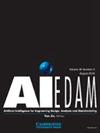制造环境中预测标准时间的机器学习算法的比较分析
IF 2.3
3区 工程技术
Q3 COMPUTER SCIENCE, ARTIFICIAL INTELLIGENCE
Ai Edam-Artificial Intelligence for Engineering Design Analysis and Manufacturing
Pub Date : 2023-01-12
DOI:10.1017/S0890060422000245
引用次数: 1
摘要
在没有适当的时间测量研究环境或制造需要复杂生产计划的项目的公司中,使用直接测量技术确定准确的标准时间尤其具有挑战性。这类公司需要新的具体的时间测量技术。本研究基于几种机器学习方法开发了一种新的时间估计方法。在制造环境中收集的一组输入,包括产品的数量,焊接操作的数量,产品的表面积因素,难度/工作环境因素,以及金属成形工艺的数量。这些数据是从土耳其最大的客车制造公司之一收集的。实验结果表明,当使用性能度量来衡量模型精度时,k近邻在预测精度方面优于其他机器学习技术。“焊接操作次数”和“工件数量”是最有效的参数。研究结果表明,机器学习算法可以估计标准时间,研究结果可用于多种目的,包括降低生产成本,提高生产率,并确保生产类似产品的其他公司执行其操作流程的效率。本文章由计算机程序翻译,如有差异,请以英文原文为准。
Comparative analysis of machine learning algorithms for predicting standard time in a manufacturing environment
Abstract Determining accurate standard time using direct measurement techniques is especially challenging in companies that do not have a proper environment for time measurement studies or that manufacture items requiring complex production schedules. New and specific time measurement techniques are required for such companies. This research developed a novel time estimation approach based on several machine learning methods. The set of collected inputs in the manufacturing environment, including a number of products, the number of welding operations, product's surface area factor, difficulty/working environment factors, and the number of metal forming processes. The data were collected from one of the largest bus manufacturing companies in Turkey. Experimental results demonstrate that when model accuracy was measured using performance measures, k-nearest neighbors outperformed other machine learning techniques in terms of prediction accuracy. “The number of welding operations” and “the number of pieces” were found to be the most effective parameters. The findings show that machine learning algorithms can estimate standard time, and the findings can be used for several purposes, including lowering production costs, increasing productivity, and ensuring efficiency in the execution of their operating processes by other companies that manufacture similar products.
求助全文
通过发布文献求助,成功后即可免费获取论文全文。
去求助
来源期刊
CiteScore
4.40
自引率
14.30%
发文量
27
审稿时长
>12 weeks
期刊介绍:
The journal publishes original articles about significant AI theory and applications based on the most up-to-date research in all branches and phases of engineering. Suitable topics include: analysis and evaluation; selection; configuration and design; manufacturing and assembly; and concurrent engineering. Specifically, the journal is interested in the use of AI in planning, design, analysis, simulation, qualitative reasoning, spatial reasoning and graphics, manufacturing, assembly, process planning, scheduling, numerical analysis, optimization, distributed systems, multi-agent applications, cooperation, cognitive modeling, learning and creativity. AI EDAM is also interested in original, major applications of state-of-the-art knowledge-based techniques to important engineering problems.

 求助内容:
求助内容: 应助结果提醒方式:
应助结果提醒方式:


